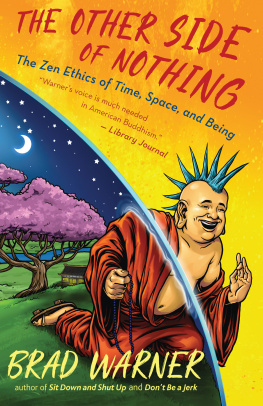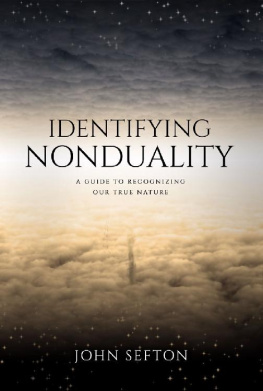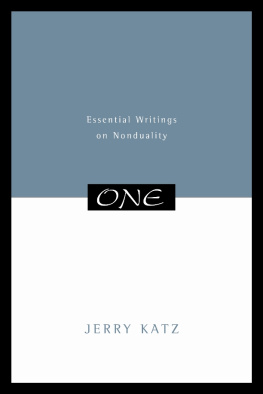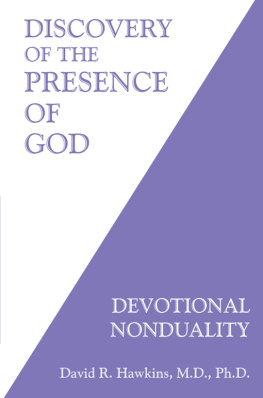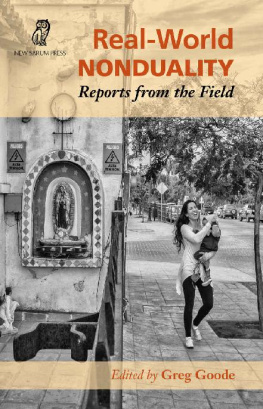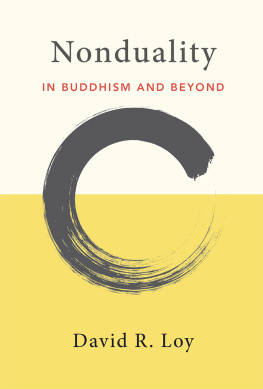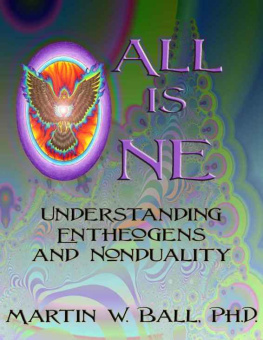Contributions keep the spiritual mission going. Donate at https://donorbox.org/contribute-to-the-spiritual-mission
Introduction
This is a collection of various questions Ive answered online over the last two years as a spiritual teacher. They proceed from a vision of nonduality. Nonduality suggests that the sense that I am a doing, suffering, enjoying person who experiences the world is an illusion. This illusion is the root cause of suffering and of existential angst. All the big questions issue from this illusion. It is the purpose of nonduality to penetrate this illusion.
This is not the best book for someone absolutely new to nonduality. Much will be very confusing for someone with no background. For a good overview, I would refer readers to my earlier book, How to Find What Isn't Lost: A Short, Pro-Intellectual, Pro-Desire Guide to Enlightenment, and to my website, siftingtothetruth.com. This is more a companion text to those resources.
The penetration of this illusion is called, variously, enlightenment, awakening, nirvana, liberation, self-realization, moksha, escape from the cycle of birth and death, and so on.
I work within a modified version of the Hindu advaita vedanta tradition. Advaita stands for not-two or nondual, and vedanta refers to the tradition that is based on the scriptures called the Upanishads. I am also very heavily indebted to Sri Ramana Maharshi, the great genius of advaita vedanta in the 20th century a sage who tremendously simplified the path.
This collection covers, in a mostly unstructured way, many of the frequent concerns and questions that seekers have. It also shows how answers to questions are contextual. They can differ depending on the person being addressed and their circumstances.
Akilesh Ayyar
Learn more and feel free to reach out to me with questions or comments at siftingtothetruth.com
Q : After I had genuine glimpses and insights how do I not let those become barriers?
A: They cannot become barriers, because there is ultimately no barrier to what you are. No barrier can stand in the way. Your path is guaranteed. Just keep going. You are assured of victory.
Q: Have you ventured into the work of awakening people yet? If so, what have you found to be most efficient? Thanks!
A: Yes. Ramana Maharshi's self-inquiry is without a doubt the most efficient way, but the real issue for 99% of the people is various psychological obstacles that have to be overcome first. People have to be honest with themselves about what they really want, and pursue it, whether or not it is enlightenment. That is the path. If someone tells themselves that they are interested in enlightenment but they are not, they will get nowhere. Self-honesty is itself a process, however. Psychodynamic or psychoanalytic psychotherapy can be helpful in this regard.
Q: Why keep searching when the truth is evident?
A: If one can stop searching and simply unconditionally relax, that is the best. But most people's dissatisfaction won't allow that. And so they must search.
Q: Can Truth/enlightenment be known and therefore experienced? Or is the closest to truth the ending of knowing/experience?
A: Yes, Truth can and does know and experience itself. It is, however, not the kind of knowledge and experience which we usually think of when we use those words. Most knowing is a dualistic knowing "I know that object as something separate from me." This is a knowing of something by itself. It cannot be understood in words, only directly recognized.
Q: You seem to have an interesting path toward awakening. What teacher / teachings would you recommend to a seeker entering such this path?
A: Ramana Maharshi's approach, most certainly. Talks with Sri Ramana Maharshi is a wonderful thing. But to understand that, I'd recommend reading as background other advaita texts like the Bhagavad Gita and Yoga Vasistha. I'll also add in The Zen Teaching of Bodhidharma. Beautiful.
I'd also recommend looking into your psychology. That's where 90% or more of the work usually is figuring out psychological obstacles. I highly recommend getting psychodynamic psychotherapy or even psychoanalysis if you're willing to spare the time. If you want a good analyst, email me and I will help you find one. A good analyst is a great guru to have.
Finding an expressive medium like writing or drawing and being able to express your emotions accurately and originally can be a critically useful instrument as well in understanding yourself and quieting the mind. Reading good literature and being acquainted with culture generally helps a lot with this.
Finally, the game is actually first and foremost figuring out your own desire. The cycle of expressing your emotions, understanding your desires, acting in the world, noticing how you feel, expressing those new feelings, and refining your understanding of what you want thats critical. Therapy, expressive art, and everything else has to be oriented around that. It is honesty about desire that will lead you to the Truth.
Q: How much importance should one place on achieving enlightenment?
A: It's really not a question of how much you "should" place on it, but how much you do. If you want the Truth badly, that's when you'll get it.
If you don't want it that badly, I highly advise that you go after what you actually do want. That will get you to the Truth faster than pretending that you want it now when you really don't.
And if you want the Truth just a little, pursue it... just a little. The key is to be honest about your feelings, and not try to psych yourself into wanting something, even enlightenment, because you "should."
That said, of course enlightenment is the supreme goal. If you want Truth badly, then strive after enlightenment with every moment and muscle.
If you want the end of suffering, if you want absolute truth, if you want inner freedom, then enlightenment is the means.
Q: Is self-inquiry also good for anxiety?
A: Yes, self-inquiry is helpful for that. But for anxiety, I would mainly recommend a) psychodynamic or psychoanalytic therapy and b) expressing your anxiety and emotions in writing/art/music... the more precise you can be with that expression, the better. But therapy is my first-line recommendation now, because navigating your emotional landscape is easier with help.


